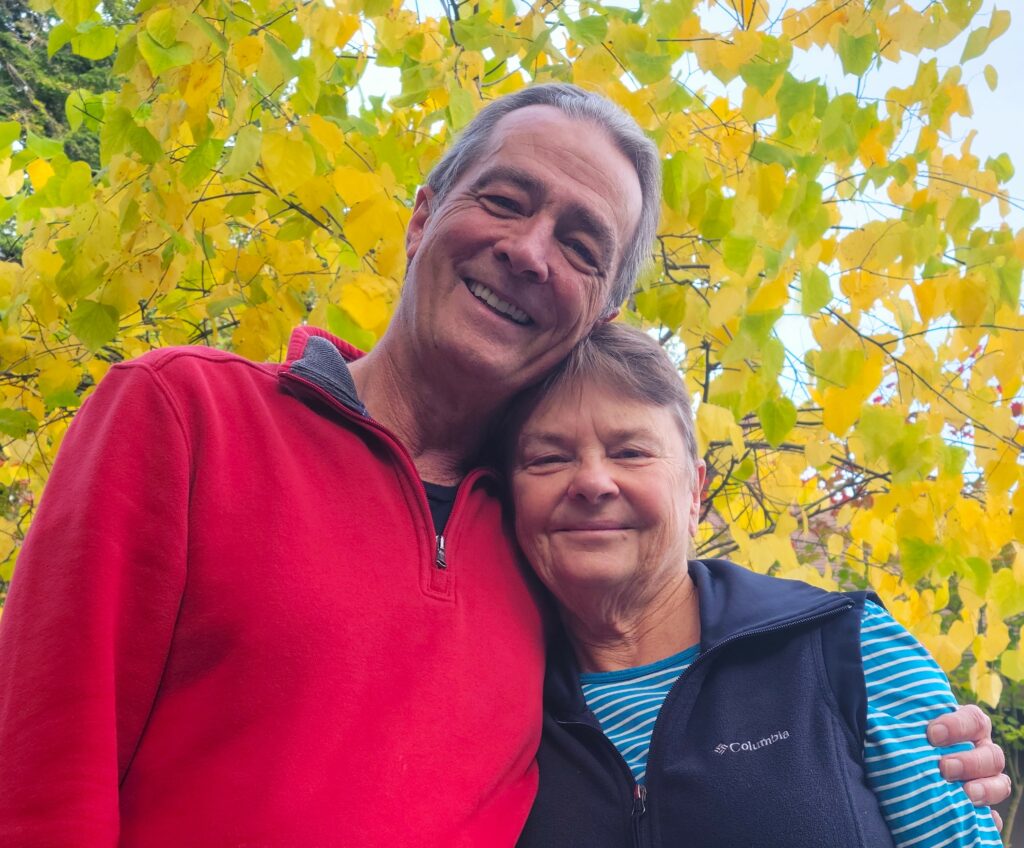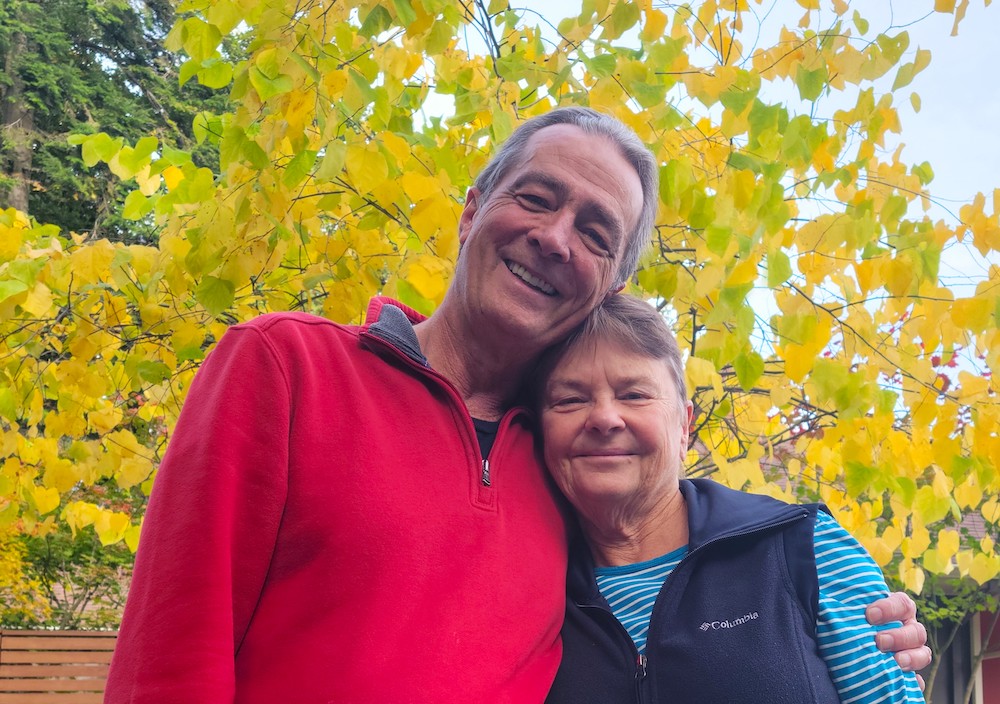Dann Wonser falleció en junio 30, 2024 18 años después de su diagnóstico de cáncer de pulmón.
enero 2024
Cuando Dann Wonser tenía 49 años - en 2006 - le hicieron una radiografía para determinar si tenía costillas rotas. Así descubrió que tenía cáncer de pulmón en el estadio 4. Las pruebas de biomarcadores mostraron las mutaciones EGFR y T790M. Durante los últimos 18 años, Dann ha tenido:
- Una lobectomía superior izquierda
- Quimioterapia tres veces
- Radiación tres veces separadas (caderas una vez, columna vertebral dos veces)
- Tres terapias dirigidas
- inmunoterapia
- Un inhibidor de la angiogénesis
- Tres ensayos clínicos

Dann atribuye a su esposa, Genevieve, y al apoyo de su familia y amigos el haberle mantenido firme durante su tratamiento - y "más allá de eso, buscar los aspectos positivos realistas en cualquier situación, y tener expectativas realistas", dijo. "Ningún tratamiento durará para siempre. Hasta ahora, siempre ha habido más opciones, ya sean ensayos clínicos o tratamientos estándar. Sólo necesito mantenerme lo suficientemente sana para llegar al siguiente tratamiento si éste deja de funcionar".
"Cuando atravieso un momento difícil, incluso un simple correo electrónico de una línea o un mensaje de texto pueden proporcionarme un gran estímulo. Una amiga me prepara sopa o pan, incluso cuando estoy bien y no tengo ninguna necesidad especial. Otra amiga me envió mensajes de texto diarios de apoyo durante más de un año, y luego me envió tarjetas cada dos semanas durante aproximadamente ese tiempo, de nuevo no siempre cuando estaba muy necesitada. El mero hecho de saber que hay gente ahí para mí y que les importo hace que los momentos difíciles sean mucho más fáciles de sobrellevar."
Dann’s history with lung cancer has given him valuable insight, and his blog (DannWonser.com) is an avenue for sharing his experiences and advice for others on this journey. He also has written a book, Second Wind: Thriving With Cancer.
Esto es lo que les diría a los que acaban de ser diagnosticados:
Have hope. Cancer treatment is exploding right now. It’s just incredible how fast things are changing – for the better.
Finding out is the hardest part. The first days, weeks, or even months are overwhelming for everyone. You will get past this – we all do. Just remember that what you are going through right now is harder than everything else you will go through. Everything else combined. The reason? You don’t have any tools to deal with it yet. That will change.
Let people in. My life is much richer and more full of love now than it ever was. That only came from sharing my trials and vulnerabilities. I have no doubt that I am alive today because of the love of, and for, family and friends. Rarely people vanished because they couldn’t cope with my cancer, and I can understand this. Much more often, people surprised me with their outpouring of caring and love. Take the risk. Still, it’s easier if you…
Plan how you are going to share your diagnosis with others. I found that by emailing people I cared about before talking with them about it, it saved me from endlessly re-living those first moments after being diagnosed, after the cancer had grown, or spread, or didn’t shrink when I had high hopes. This gave friends and family time to compose themselves before they talked with me, and because of that, the conversations went much better. This way I could also set the tone that I hoped that they would reflect back to me. It works.
Throw the statistics out the window. If you’ve been diagnosed for longer than 12 hours, you have probably already done an internet search and tried to calculate your survival odds and/or your new life expectancy. Finding statistics that match your specific situation is nearly impossible. For example, the average age of diagnosis for lung cancer is 71. I was 49. Do you think treatment outcomes will be the same? General health, the genetic profile of your cancer, environmental factors, location/size/number of tumors etc. – there are too many variables to make the stats make any sense for an individual. Beyond that, your attitude and actions make a difference.
Y lo que es más importante, cualquier estadística que encuentre probablemente esté irremediablemente desfasada. Los nuevos tratamientos aparecen demasiado rápido para que las estadísticas puedan seguirles el ritmo.
A diagnosis is not a prognosis. I attended a conference last year with 150 lung cancer survivors. Most of us attending have, or had, Stage IV lung cancer, and a dozen have been alive for at least five years. If that’s not enough, I am your living example. I was first diagnosed in 2006. One woman I know has had five different cancers, and is still alive 25 years later. The same diagnosis yields different results for different people.
Do your homework. Your survival chances are directly related to the quality of the treatment providers you work with. Is your oncologist a specialist in your specific type of cancer? As a general rule, the more people that your doctor and your treatment center have treated that have the same type of cancer as yours, the higher their success rate. Experience makes a difference. Who are the recognized experts in your type of cancer that are within a radius that you are willing to travel?
Get molecular testing. The most promising breakthroughs in cancer treatment are at the molecular level. This includes both targeted genetic treatments and immunotherapy. If your oncologist doesn’t think you need it, consider the possibility that your oncologist is out of step with the latest research. You may want a second opinion.
Re-think clinical trials. “Clinical trials” used to be considered the last gasp desperation approach to treatment. The reality is that, for lung cancer and many other types of cancer, this is where you will find the most promising, cutting-edge medicine, with the best results, and with the least side effects.
Exercise, sleep, and diet all make a difference. They impact your mood and your ability to cope. More importantly, you will recover from medication, radiation, and surgery better and faster if you are in the best shape you can be. Take care of yourself. Exercise, sleep, and diet. In that order. One man’s opinion.
Attitude matters. Treasure the moment. Live in gratitude for what you have right now. Choose hope. These things not only improve your quality of life, they also improve your chances of living a longer life.
Love yourself. Treat yourself like you matter. Because you do. This may be your last chance to act like it.
Choose your own path. I’ve laid out the way I see it. You may see it differently. Find your own vision of the future, and own it.
> Learn more about biomarker testing for lung cancer.
> Find out more about clinical trials and use our search tool to see what trials might be available for you.
